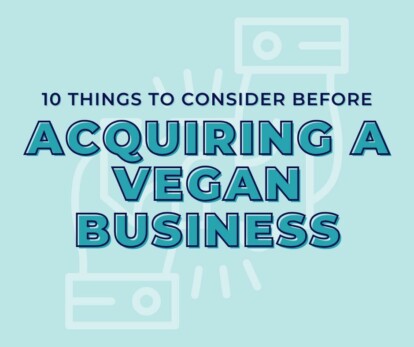The Link Between Plastic And Veganism


Buying a business is a big step. It can feel exciting, maybe even a little daunting, but it also opens doors that might otherwise take years to unlock. You could find yourself with access to new customers, fresh skills, or a market that’s been out of reach until now. When the fit is right, an acquisition can transform not only your own growth but also the impact you have within the vegan movement.
Buying a business isn’t only about looking at numbers on a spreadsheet. For vegan entrepreneurs, there’s another layer to consider. More than assets or contracts, you’re taking on what that business stands for, and the role it plays in shaping how our fellow animals, humans, and the planet are treated.
That’s why due diligence needs to extend beyond finances. Performance, potential, and, most importantly, values all deserve attention. Below are ten areas worth exploring in detail.
Before getting into negotiations, pause and ask yourself: Why am I even considering this acquisition? The answer will shape every decision that follows.
Some other questions worth asking at this early stage are:
Having a clear purpose stops you from being swept up by novelty or pressured into an opportunity that doesn’t really fit. Long-term goals matter here. You need to know whether the business you’re looking at can realistically help you achieve them.
Plenty of entrepreneurs have bought businesses that looked good on paper but turned out to be distractions. When your work is driven by both profit and purpose, it’s your mission that must function as the compass.
Numbers matter. Not because money is the end goal, but because financial instability can quickly get in the way of your ability to live out your values. A business that looks appealing on the surface might turn into a drain if the finances aren’t sound.
Some of the things worth digging into are:
It’s not just about whether the business is profitable, but how that profit is being made.
Some businesses look healthy only because they’ve cut corners that clash with vegan principles. If that’s the case, ask yourself whether you’d realistically be able to change those practices without undermining the viability of the business.
Businesses don’t run in a vacuum. The way an organisation performs is shaped by competitors, industry trends, suppliers, and the expectations of its customers and community.
As vegan entrepreneurs, we must also consider the ethical landscape. A business might be profitable right now, but if it relies on practices that clash with the growing demand for cruelty-free and sustainable options, it could face difficulties in the future. On the other hand, a small but well-positioned brand that taps into rising trends may offer real potential for growth.
Some of the questions to think about are:
Scalability is another important piece of the puzzle. A single-location café might thrive locally but struggle to replicate elsewhere. By contrast, a direct-to-consumer subscription service may be easier to expand. Being realistic about scalability will help you determine whether the opportunity aligns with your ambitions.
For vegan entrepreneurs acquiring a business, this is one of the most important parts of due diligence. If the business is already vegan, ask whether its practices and culture genuinely reflect the values you want to uphold.
In some cases, you may come across a business that isn’t fully vegan but could be transitioned to one. If that’s the plan, consider how much change would be needed and whether the existing customer base would embrace it.
Plenty of businesses that call themselves “plant-based” or “green” still have ties to exploitative practices. Sometimes, the opportunity arises to strengthen a brand and bring it fully in line with vegan principles. Other times, the compromises may be too deep to untangle.
Trust is one of the most valuable currencies in the vegan and ethical space. Consumers here are often highly attuned to signs of “selling out” or greenwashing, and once trust is damaged, it can be challenging to regain.
Before moving forward, it’s worth exploring:
If the business you’re considering already has a shaky reputation, you’ll need a clear plan for rebuilding trust. On the other hand, inheriting a loyal and values-driven community can be one of the biggest advantages of an acquisition. It can give you a ready-made base of support and a powerful platform for growth.
Behind the scenes, how well does the business function day to day? Strong operations are often invisible, but weak ones quickly become your problem the moment you take over.
Some areas to explore are:
That last point is important. Many small businesses are built around the founder’s habits and instincts. If those aren’t documented, you risk losing critical knowledge the moment they step away.
When you buy a business, you’re not just buying products or customers. You’re inheriting the infrastructure that keeps it all running. If the systems are chaotic, they’ll quickly sap your time, energy, and money.
A good test is to ask: could someone new step in tomorrow and understand how things work? If not, there’s work to do before you can think about scaling or integrating successfully.
As mentioned above, many small businesses revolve around their founder. That can be both a strength and a risk. When too much depends on one person, the business may wobble if they leave.
Some of the questions worth asking include:
It’s not realistic to expect every staff member to be vegan. What matters is whether they support the business’s purpose, respect its principles, and are willing to adapt to changes you introduce. A team that feels connected to the mission, even if they don’t all live it personally, can still be a powerful force for growth.
In situations where the founder carries a significant amount of knowledge, it’s common to negotiate a handover period as part of the sale. This could be a few weeks of introductions and training, or a longer consultancy-style arrangement where the seller stays on for several months.
A structured handover reduces the risk of key information being lost and helps reassure staff, customers, and suppliers during the transition. If this could be an issue, it’s vital to discuss handover options early in the negotiations and information gathering stage.
Sometimes acquiring a business means cultural transformation as well as operational change. Building a supportive, mission-aligned culture takes patience, but it’s one of the most valuable investments you can make.
Every acquisition involves legal due diligence, but vegan businesses often carry added considerations that you can’t afford to miss.
Areas to review include:
The best first step is to engage a solicitor who has experience in mergers and acquisitions, ideally with a background in the industry that you plan to operate in.
For certifications, contact the relevant bodies directly and inquire about the procedures for changes in ownership. For contracts, have a legal professional review the fine print so you don’t inherit obligations you weren’t prepared for.
Skipping this step leaves you vulnerable. You might discover too late that a recipe you thought was proprietary isn’t legally protected, that a certification you relied on can’t be carried over, or that you’ve taken on hidden liabilities like safety recalls or misleading claims. Any of these could bring significant financial and reputational costs.
Legal due diligence isn’t the most glamorous part of an acquisition, but it’s the safety net that stops an opportunity from becoming a liability. Getting the right advice at this stage is worth every penny.
If you already run a business, one of the big questions is whether the new acquisition will slot neatly into what you’ve built or whether it would be better to let it stand on its own.
It helps to consider:
Vegan customers care about the story behind a brand. When ownership changes, they often want reassurance that the values won’t change with it.
Being open about your intentions, clear about what will stay the same, and upfront about how the acquisition strengthens the mission will go a long way towards building trust.
It makes sense to end where you began: with your purpose. By the time you’ve worked through finances, systems, culture, and reputation, it’s easy to get caught up in the detail. But the final question is the same as the first: does this acquisition bring you closer to your mission, or could it pull you off track?
The numbers tell part of the story, but your values and long-term vision tell the rest. When they align, acquisitions can be a powerful way to grow both your business and your impact. When they don’t, the braver choice is often to step away.
Acquiring a business is about more than transactions and contracts. For a vegan entrepreneur, it’s a chance to grow your reach and strengthen your impact while staying true to your values. That balance isn’t always easy to strike, but it’s the thread that runs through every successful acquisition.
The practical checks, from finances and systems to people and compliance, will tell you whether the business can function well. The deeper questions about ethics, culture, and purpose will tell you whether it belongs in your hands. Both matter.
If you keep your mission in view while working through the details, an acquisition can become more than a growth strategy. It can be a way to build the kind of business world you want to see: one that helps people choose compassion and gives our fellow animals and the planet the respect they deserve.